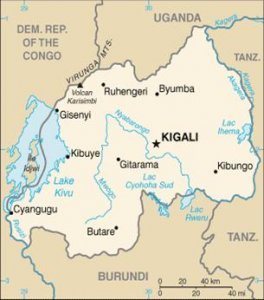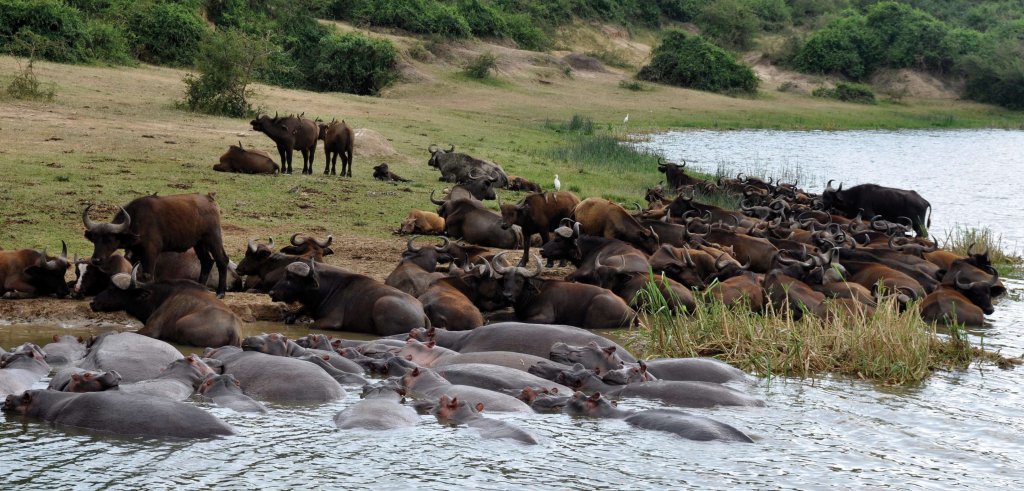
GEOGRAPHY
Rwanda is a small mountainous country in central Africa, bordered to the north by Uganda, to the east by Tanzania, to the south by Burundi and the west by the Democratic Republic of Congo. The country is divided by great peaks of up to 9,842ft, which run across the country from north to south. The Virunga volcanoes, rising steeply from Lake Kivu in the west, slope down first to a hilly central plateau and further eastwards to area of marshy lakes around the upper reaches of the A’Kkagera River, where the A’Kagera National Park is situated. Also known as ‘the land of a thousand hills’, Rwanda is a landlocked country of lovely and various landscapes. The Virunga volcanic mountains have high altitude forests and world-famous mountain gorillas.
HISTORY
For centuries, the Hutu, Tutsi and Twa of Rwanda shared the same culture, language and religion. In 1916, Belgium took control of Rwanda from Germany and installed a rigid colonial system of racial classification and exploitation.

By elevating the Tutsi over the Hutu, the Belgians created deep resentment among the Hutu majority. In 1959, control of Rwanda went to the Hutu majority. Following independence came decades of institutionalized anti-Tutsi segregation and massacre. Hundreds of thousands of Tutsis and moderate Hutus were forced into exile. In 1988, some of these refugees formed a rebel
movement called the Rwandan Patriotic Front (RPF) to reclaim their homeland. A deadly cycle of war and massacre continued until 1993, when the United Nations negotiated a power-sharing agreement between the two sides.
To protect their power, hard-line Hutu extremists resisted the implementation of the agreements and planned one of the most terrifying genocides in history. In 1994 in Rwanda, a landlocked country slightly smaller than Massachusetts, at least 800,000 members of the Tutsi ethnic minority and moderate Hutu sympathizers were systematically murdered in 100 days. The killing was quickly implemented throughout the country at a rate of approximately 8,000 people per day. Most of the victims were killed in their villages and towns, often by their neighbors. The genocide ended when the RPF, led by Paul Kagame, brought the country under their control and overthrew the Hutu regime. Every Rwandan was deeply touched by the genocide; no one was exempt.
THE PEOPLE
Rwanda’s population density, even after the 1994 genocide, is among the highest in Sub-Saharan Africa (590 per sq. mi.). Nearly every family in this country with few villages lives in a self-contained compound on a hillside. The urban concentrations are grouped around administrative centers. The indigenous population consists of three ethnic groups. The Hutus, who comprise the majority of the population (85%), are farmers of Bantu origin. The Tutsis (14%) are a pastoral people who arrived in the area in the 15th century. The Twa (1%) are thought to be the remnants of the earliest settlers of the region.
SOCIAL CONVENTIONS
The traditional way of life is based on agriculture and cattle. The Rwandans settle in the fertile areas, but they do not form villages, each family being surrounded by its own fields. The majority of the population belongs to the Hutu tribe. There’s a significant Tutsi minority (15%) and a smaller minority of Twa, a mixed race of traditional potters and hunters and said to be the country’s first inhabitants. Normal social courtesies apply.
LANGUAGES
The official languages are Kinyarwanda, French and English. Kiswahili is used for trade and commerce.
GOVERNMENT
Republic since 1962. Gained independence from Belgium in 1962. Domestically, the government faced a formidable task of reconstruction and reconciliation.
The architects of the 1994 genocide have been (and still are being) tried before a UN-run tribunal based in Tanzania. Lesser offenders are dealt with in Rwanda. The government has a fairly impressive record under extremely difficult circumstances.
TIME ZONE
Standard Time Zone: GMT +2. No daylight saving time.
ELECTRICITY
220 volts AC, 50Hz.
CLIMATE
Despite it’s proximity to the Equator, the high altitude cools the climate in Rwanda. It is warm throughout most of the country, but cooler in the mountains. There are two rainy seasons: mid-January to April, and mid-October to mid-December.
Clothes to Wear:
- Warm clothes including a fleece or light wool sweater;
- Padded sleeveless waistcoat with deep pockets for valuables, film, papers, etc;
- Lightweight wool socks;
- Long-sleeved shirt;
- Strong waterproof walking boots, gaiters useful;
- Sturdy trousers;
- Sunglasses & high factor sun screen;
- A sun hat with a small brim;
- Breathable lightweight rain poncho/parka & rain hat;
- Small backpack to carry water;
- Gloves recommended for those with sensitive skin or allergy to nettles.
LOGISTICAL
Entry & Exit Requirements:
A passport is required but visas are not required for U.S. citizens entering Rwanda for less than 90 days. Detailed entry information may be obtained from Rwanda’s Directorate of Immigration. Visit the Embassy of the Republic of Rwanda for the most current visa information. In Washington, D.C., the Embassy is located at 1714 New Hampshire Avenue, NW, Washington DC 20009. Tel: 202-232-2882. Fax: 202-232-4544. Overseas, inquiries may be made at the nearest Rwandan Embassy or Consulate.
U.S. citizens living or traveling in Rwanda are encouraged to register with the nearest U.S. Embassy or Consulate through the Department of State’s travel registration page in order to obtain updated information on travel and security. U.S. citizens without Internet access may register directly with the nearest U.S. embassy or consulate. Registration is important; it allows the State Department to assist U.S. citizens in an emergency.
Embassy Locations:
2657 Avenue de la Gendarmerie
Kigali, Rwanda
Tel: [250] (252) 596-400
Fax: [250] (252) 596-591
http://rwanda.usembassy.gov/
Embassy of Canada to Rwanda
1534 Akagera Street
Kigali, Rwanda
Tel: (+250) (252) 573-210
Fax: (+250) (252) 572-719
http://www.canadainternational.gc.ca/kenya/offices-bureaux/contact-rwanda-contactez.aspx?lang=eng
HEALTH
Evidence of yellow fever immunization is required for those 9 months of age and older. Yellow fever can cause serious medical problems, but the vaccine is very effective in preventing the disease. There are periodic outbreaks of meningitis in Rwanda; the meningitis vaccine is recommended if you are traveling during dry season. Tuberculosis is an increasingly serious health concern in Rwanda. For further information, please consult the CDC’s information on TB.
Malaria is endemic to Rwanda. All visitors are strongly encouraged to take prophylactic medications to prevent malaria. These should be initiated prior to entry into the endemic area. Because of possible counterfeit of anti-malarial medications, these should be obtained from a reliable pharmaceutical source. Schistosomiasis, transmitted by waterborne larvae that penetrate intact skin, presents significant risk throughout the country, especially in Lake Kivu and surrounding areas. Travelers should avoid freshwater exposure.
Information on vaccinations and other health precautions, such as safe food and water precautions and insect bite protection, may be obtained from the Centers for Disease Control and Prevention’s (CDC) hotline for international travelers at 1-800-CDC-INFO (1-800-232-4636) or via the CDC website at http://wwwnc.cdc.gov/travel. For information about outbreaks of infectious diseases abroad, consult the infectious diseases section of the World Health Organization (WHO) website at http://www.who.int/topics/infectious_ diseases/en/. The WHO website also contains additional health information for travelers, including detailed country-specific health information.
Banks & Currency:
Rwanda Franc (RWF) = 100 centimes. Notes are in dominations of RWF 5,000, 1,000, 500, and 100. Coins are in dominations of 50, 20, 10, 5, 2 and 1 centimes.
Credit cards are accepted at only a few hotels in Kigali. MasterCard is most widely accepted, with more limited use of Diners Club. It may be difficult to change traveler’s checks outside Kigali.
Banking hours: Monday to Friday 8am – 12pm and 2pm to 6pm, Saturday 8am to 1pm.
Communication:
Telephone Country code: 250. There are no area codes. There is International Direct Dialling but this may be subject to occasional disruptions.
Cell Phones: Roaming agreements exist with one international mobile phone company. Handsets can be hired. Coverage is quite unreliable.
There are Internet cafes in Kigali, including one at the airport.
Post office hours: (Kigali) Mon-Fri 8am-12pm and 2pm-5pm, Sat 8am-12pm.
Cell Phone Usage:
Please contact your cell phone provider to determine whether your contract includes coverage in the country you are visiting. Depending on your contract you may have to add international services and/or country specific services.
ENTERTAINMENT
Food & Drink:
Only eat well-cooked meat and fish, preferably served hot. Pork, salad and mayonnaise may carry increased risk. Vegetable should be cooked and fruit peeled. Rwandan food is quite simple, with beans, bananas, sweet potatoes, potatoes, and sorghum being the most common foods. Those who can afford to do so also eat meat, primarily beef, goat, and chicken. Rwandans traditionally eat food in public settings only for ceremonial purposes, but otherwise eat only in the home. In recent years, the taboo on eating in public has diminished significantly, and restaurants have appeared in most urban areas. While the system of clans has diminished sharply in importance in Rwanda, most Rwandans will still not eat the totemic animals associated with their clans.
Water used for drinking, brushing teeth or making ice should have first been boiled or otherwise sterilized. Bottled water is highly recommended. Powdered or tinned milk is available and is advised, but make sure that it is reconstituted with pure water. Avoid dairy products that are likely to have been made from unboiled milk. Dairy products are widely consumed, particularly a traditional drink of curdled milk. Sorghum and banana beers are common as well.
Nightlife:
There are a few cinemas in Kigali. The Rwanda National Ballet is famous for its traditional dancing and singing, and can be seen either at national ceremonies or sometimes on request in the villages. There are now several nightclubs, with African, Congolese and Western music; there are also some live music bars with food and dancing available. The French Cultural Center runs a variety of activities.
Shopping:
Special purchases include woven baskets with pointed lids, native clay statuettes, masks and charms. Do not buy souvenir gorilla skulls or hands; if they are offered, report the trader to the police. Shopping hours: Mon-Fri 08:30 am-1pm and 2pm-05:30 pm, Sat 08:30 am-12:30pm.
BAGGAGE
Baggage rules for international and domestic air travel have changed much in recent years, differ from carrier to carrier and these days even may cover your on-board bags. Checking luggage may cost a separate fee or may be free depending on your personal status with the carrier. We therefore encourage you to read your ticket’s small print and/or contact your carrier for exact rules.
TIPPING
Tipping is not usually expected – or even accepted – though in tourist areas locals are becoming used to this and a tip of 5-15% is often appreciated.
LAUNDRY
Laundry service is available at most hotels in the main centers. Generally you should allow about 24-hours before the item is returned to you, however, some have an emergency service available at an extra charge.
PHOTOS & VIDEOS
In some countries you must refrain from photographing sites such as Military bases and industrial installations. Also be aware of cultural sensitivities when taking pictures of or near churches and other religious sites. It is always courteous to ask for permission before taking photographs of people.
USE OF DRONES
The use of drones is being legislated by many countries. In some cases drones are already forbidden and their unauthorized use may carry severe penalties. If you plan to travel with a drone please contact the embassy or consulate of the country you wish to visit.
![SITA Canada Final_color [Converted]new_for_wp SITA Canada Final_color [Converted]new_for_wp](https://sitatourscanada.com/wp-content/uploads/2019/12/SITA-Canada-Final_color-Convertednew_for_wp.png)
